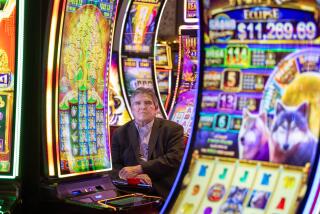Tribes Watch Their Own Casinos
Indian casinos in California are regulated by a web of tribal, state and federal agencies.
The primary responsibility for ensuring the integrity of gambling rests with individual tribal governments. As sovereign entities, they are not required to make public information about how they regulate their casinos.
Native American leaders estimate that tribes spend more than $260 million a year and employ more than 2,700 people to enforce regulations at about 350 casinos nationwide.
“Tribes have made regulation their No. 1 priority,” said Ernest Stevens Jr., chairman of the National Indian Gaming Assn., a Washington trade group.
Although many tribes in California appoint their own members to the gaming commissions that oversee their casinos, others have recruited people with experience in law enforcement and casino regulation.
The Cabazon Band of Mission Indians in Indio relies entirely on non-tribal commissioners, in part because it has only 30 adult members.
“I think their view was, ‘We have nothing to hide. Let’s have outsiders keep an eye on this and take tribal politics and favoritism out of it,’ ” said Glenn Feldman, Cabazon’s gaming lawyer, who also represents the Chumash Indians.
The Viejas Band of Kumeyaay Indians in San Diego County employs a non-tribal commissioner who has overall responsibility for regulating its casino. His decisions can be appealed to an independent Gaming Review Board consisting of a retired Air Force colonel, a judge and a former U.S. Drug Enforcement Administration official.
“Most tribal governments have enough foresight to know that their regulatory agency should be beyond reproach, at least as far as backgrounds go,” said Norm Des Rosiers, the Viejas gaming czar.
California tribal casinos also are monitored by three government agencies.
The National Indian Gaming Commission, established by Congress in 1988, conducts periodic inspections to ensure that Indian casinos are complying with internal control standards.
Chairman Philip Hogen said his agency “looks over the shoulder” of tribes. He said he is confident that Indian casinos are free of corruption but acknowledged that giving tribes the primary regulatory role creates an appearance of “the fox watching the henhouse.”
The state attorney general’s Division of Gambling Control performs background investigations on key casino employees and audits some financial information. Agents attempt to visit all Indian casinos quarterly and provide tribes with confidential reports.
Tribes have donated more than $900,000 to Atty. Gen. Bill Lockyer since 1998, campaign records show. A Lockyer spokesman said the political donations do not influence the work of the gambling control division.
But according to four former agents, the attorney general’s office stymied investigations into alleged corruption, embezzlement and thefts at Indian casinos during the last four years. The agents are suing the attorney general’s office as part of a job discrimination claim.
The agents allege in court papers that Harlan Goodson, former director of the gambling control division, ordered them to “go lightly” in dealing with tribes.
Goodson, who now represents Indian gambling interests for the law firm Holland & Knight, said that those who accuse the division of going “soft” on gambling tribes don’t understand the agency’s role.
“We didn’t have authority to tell [tribes] what to do,” Goodson said. “I had to build relationships through the use of diplomacy.”
The California Gambling Control Commission is responsible for approving licenses for key casino employees and gaming devices. Since 2000, the commission has approved licenses for approximately 1,400 casino employees without rejecting a single applicant.
The commission has no real authority to keep Indian casinos free of corruption, said former chairman John Hensley, a onetime federal law enforcement official. He resigned last year after repeated clashes with tribes over his efforts to impose stricter regulatory standards.
“Who knows what is going on in these casinos?” Hensley said. “I guess if you don’t know and don’t look, everything is fine.”
More to Read
Start your day right
Sign up for Essential California for news, features and recommendations from the L.A. Times and beyond in your inbox six days a week.
You may occasionally receive promotional content from the Los Angeles Times.






